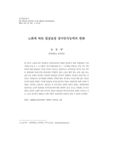

-
 * 본 문서는 배포용으로 복사 및 편집이 불가합니다.
* 본 문서는 배포용으로 복사 및 편집이 불가합니다.
미리보기
서지정보
· 발행기관 : 한국인간발달학회
· 수록지 정보 : 인간발달연구 / 21권 / 1호
· 저자명 : 김영경
목차
Ⅰ. 서 론
Ⅱ. 연구방법
Ⅲ. 결과 및 해석
Ⅳ. 논의 및 결론
참고문헌초록
본 연구는 노화에 따른 얼굴표정 정서인식능력의 변화를 알아보기 위해 수행되었다. 청년
79명(18-27세, M = 21.71세)과 노인 81명(63-86세, M = 72.54세)을 대상으로 여섯 가지 기본
정서에 대한 얼굴표정 자극을 정지된 사진으로, 동영상으로, 정서강도별 순차적 사진 제시
로 정반응률과 반응시간을 알아보았다. 변량분석 결과, 노인은 행복, 혐오, 공포, 슬픔, 분노,
놀람 모든 유형의 정서에서 청년보다 얼굴표정 정서인식 정확률이 저조하고 반응시간은 긴
것으로 나타났으며, 정서유형별 정확률은 연령증가에도 불구하고 특이한 변화 없이 청년과
유사한 양상을 보였다. 이러한 얼굴표정 정서인식능력의 저하는 상관분석을 통해 노화에 수
반되는 처리속도, 결정지능, 유동지능 등 인지기능의 감퇴와 관련이 있었고, 회귀분석에서
결정지능은 노인의 얼굴표정 정서인식능력에 대한 설명력이 있는 것으로 나타났다. 본 연구
결과는 정상적 노화에 의한 인지기능 감퇴가 얼굴표정 정서인식능력의 저하를 가져오고, 이
는 노인이 정서인식 결함으로 인해 사회적 상호작용에 어려움이 있을 수 있음을 시사한다.영어초록
The present study investigated changes in aging through facial expression recognition. 79 younger adults
(M = 21.71, SD = 2.40) and 81 older adults (M = 72.54, SD = 4.97) assessed facial expression stimuli
with six basic emotions, including happiness, fear, anger, disgust, sadness, and surprise. The participants
were also tested on their processing speed, crystallized intelligence, and fluid intelligence. The older adults'
performances were lower than those of the younger adults in all six emotions and the patterns of correct
recognition rate for each emotion were similar in both younger and older adults. The decreased
performances for the recognition of facial expressions were related to the decline of cognitive abilities and
crystallized intelligence was a significant predictor. These findings support the idea that the decrease of
cognitive abilities by normal aging affects the deficits of facial expression recognition and suggest that
older adults may have difficulties in social interaction due to declining emotion recognition ability.참고자료
· 없음태그
-
자료후기
-
자주묻는질문의 답변을 확인해 주세요

꼭 알아주세요
-
본 학술논문은 (주)학지사와 각 학회간에 저작권계약이 체결된 것으로 AgentSoft가 제공 하고 있습니다.
본 저작물을 불법적으로 이용시는 법적인 제재가 가해질 수 있습니다. -
해피캠퍼스는 구매자와 판매자 모두가 만족하는 서비스가 되도록 노력하고 있으며, 아래의 4가지 자료환불 조건을 꼭 확인해주시기 바랍니다.
파일오류 중복자료 저작권 없음 설명과 실제 내용 불일치 파일의 다운로드가 제대로 되지 않거나 파일형식에 맞는 프로그램으로 정상 작동하지 않는 경우 다른 자료와 70% 이상 내용이 일치하는 경우 (중복임을 확인할 수 있는 근거 필요함) 인터넷의 다른 사이트, 연구기관, 학교, 서적 등의 자료를 도용한 경우 자료의 설명과 실제 자료의 내용이 일치하지 않는 경우
“인간발달연구”의 다른 논문도 확인해 보세요!
-
중학생의 초기 부적응 도식이 지연행동에 미치는 영향: 부정적 평가에 대한 두려움, 자기구실 만들기의 매개 효과를 중심으로 22 페이지
본 연구는 중학생의 초기 부적응 도식과 지연행동 간의 관계에서 부정적 평가에 대한 두려움과 자기구실 만들기의 매개효과를 검증하고자 하였다. 이를 위하여 수도권 소재 남녀 중학생 456명을 대상으로 설문 조사하였고, SPSS 18.0과 AMOS 18.0을 사용하여 자료를 분석하였다. 선행 연구 결과를 바탕으로 연구모형 과 경쟁모형을 설정하고 비교 검증한 결과.. -
9개월부터 28개월까지 영아의 공동주의의 변화가 아동 초기 언어능력에 미치는 영향 16 페이지
본 연구에서는 영아기부터 초기 아동기까지의 공동주의 발달양상과 아동 초기 언어능력간 관 련성을 알아보고자 하였다. 이를 위해 97명의 영아들을 대상으로 9개월부터 28개월까지 여러 시점에서 영아-어머니 자유놀이 상황을 통해 공동주의를, 만 3세에 K-CDI 아동발달검사 중 언 어관련 하위 소검사로 언어능력을 측정하였다. 잠재성장모형을 통해 분석한 결과, 영.. -
학교환경요인이 청소년의 학교폭력 가해에 미치는 영향에서 가정폭력 경험의 조절효과 21 페이지
본 연구는 학교환경요인이 청소년의 학교폭력 가해에 미치는 영향에서 가정폭력 경험의 조절효과를 알아 보고자 광주광역시 소재 중학교에 재학중인 청소년 259명을 대상으로 질문지법을 이용해 자료를 수집하 였다. 청소년의 학교환경요인으로는 교사지지, 학교유해환경 접촉, 학교폭력 사후조치, 방과후 활동, 학교 폭력 방관, 학교폭력 불안 등 총 6가지의 변수를 포함시.. -
유아기 수줍음 및 어머니의 양육방식이 대학생의 협조성에 미치는 영향: 마음이론 능력의 매개효과를 중심으로 20 페이지
본 연구는 유아기 수줍음과 어머니의 양육방식이 대학생의 마음이론 능력을 매개로 대학생의 협조성 발 달에 영향을 미치는 구조적 관계를 분석하는데 연구 목적을 두었다. 연구대상은 수도권 소재 4년제 대학 교의 남녀 대학생 총 466명이며, 마음이론 능력은 조사자가 문제를 읽어주고 학생들이 답을 체크하는 방 식으로, 그 외 모든 척도는 대학생의 자기보고로 측정하.. -
관계적 공격성에 대한 국내 연구동향 분석: 2000년∼2013년 20 페이지
이 연구의 목적은 관계적 공격성에 대한 국내연구의 동향을 알아보고자 함에 있다. 이를 위 해 2000년부터 2013년까지의 한국연구재단 등재후보지이상의 학술지논문과 석?박사학위논문 97편을 대상으로 연구분야, 연구대상, 연구방법(자료수집방법, 평정방법, 분석방법, 측정도구), 연구변인, 연구결과에 따라 분석하였다. 이 연구의 주요 결과는 다음과 같다. 첫째..
문서 초안을 생성해주는 EasyAI


